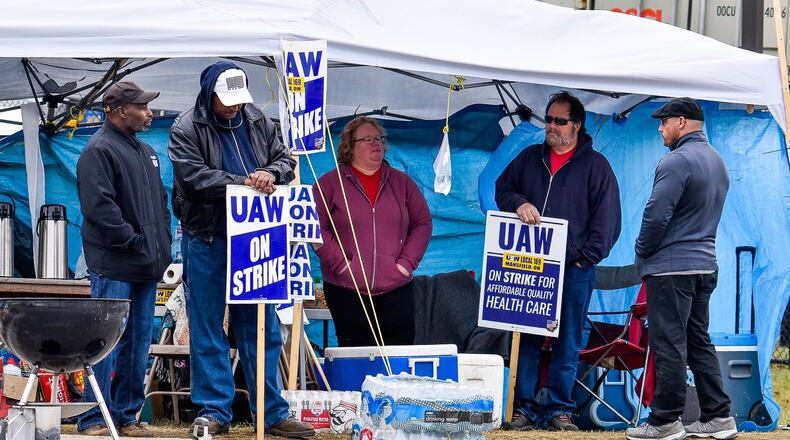No details on the proposal were offered, and the strike has not been called off yet. A meeting of national and local unit UAW leaders has been called for today in Detroit.
A vote by union members may take several days.
Members of United Auto Workers Local Union 696 picketing Wednesday outside General Motors’ Parts Distribution Center in West Chester Twp. seemed cautiously optimistic.
“We’re excited and … very hopeful something good’s going to happen,” said Daniel Schmidt of West Chester, who has worked for GM for eight years. “Hopefully we can get something worked out to where we can get our temps hired in a timely manner.”
FIRST COVERAGE: What picketing GM workers are saying in West Chester
UAW members also remain hopeful they can get “a big increase” in benefits and “not the cut that General Motors was trying to get us to settle on,” Schmidt said.
“Those are our big main issues,” he said.
The strike, which has just entered its second month, has had wide ripple effects. Moraine truck engine producer DMAX — which makes diesel engines for GM heavy-duty trucks — has about 550 workers on temporary layoff due to the strike, which has halted production at more than 50 GM plants in 10 states.
Chris Blizard, president of UAW Local 402, said about 1,400 workers were temporarily laid off at Navistar in Springfield because of the strike.
Blizard said Navistar’s main line in Springfield, which builds medium-duty trucks including GM models, and its line two, which makes cutaway GM vans, both shut down.
Several facilities that provide parts to the Springfield plant were also affected by the GM strike leading to a shortage in parts.
On Tuesday, Carl Kennebrew, president of the Moraine-based IUE-CWA union, said that he did not expect layoffs at the MAHLE Behr plant in Dayton, where about 1,600 people are employed.
Auto dealers and repair companies have also told the Dayton Daily News the strike has had an impact on repair orders.
“Bad enough that anything very serious that is not driveable is probably not going to get fixed until after the strike is resolved,” said Tim Trimbach, owner of Trimbach’s body shop in Tipp City.
Trimbach said he is forced to tell some prospective customers that their GM vehicles simply can’t be fixed until he and others can obtain parts again.
» BIZ BEAT: Kroger laying off hundreds of workers
“Minor jobs we can usually limp by on and get people driveable and keep them to where they’re safe to drive on the road until we can get the remainder of the parts in at a later date,” he said. “The non-driveables are the ones that are a problem.”
Terms of the tentative four-year contract were not released, but it’s likely to include some pay raises, lump sum payments to workers, and requirements that GM build new vehicles in U.S. factories. Early on, GM offered new products in Detroit and Lordstown, Ohio, two of the four U.S. cities where it planned to close factories.
The company offered to build a new electric pickup truck to keep the Detroit-Hamtramck plant open and to build an electric vehicle battery factory in or near Lordstown. The battery factory would employ far fewer workers and pay less money than the assembly plant.
GM and the union have been negotiating at a time of troubling uncertainty for the U.S. auto industry. Driven up by the longest economic expansion in American history, auto sales appear to have peaked and are now heading in the other direction. GM and other carmakers are also struggling to make the transition to electric and autonomous vehicles.
Meanwhile, President Donald Trump’s trade war with China and his tariffs on imported steel and aluminum have raised costs for auto companies. A revamped North American free trade deal is stalled in Congress, raising doubts about the future of America’s trade in autos and auto parts with Canada and Mexico, which last year came to $257 billion.
Amid that uncertainty, GM workers have wanted to lock in as much as they can before things get ugly. They argue that they had given up pay raises and made other concessions to keep GM afloat during its 2009 trip through bankruptcy protection. Now that GM has been nursed back to health — earning $2.42 billion in its latest quarter — they want a bigger share.
If approved, the contract agreement will set the pattern for negotiations at Fiat Chrysler and Ford. It wasn’t clear which company the union would bargain with next, or whether there would be another strike.
In past years, it’s taken a minimum of three or four days and as long as several weeks for the national ratification vote. Workers took almost two weeks to finish voting on their last GM agreement, in October of 2015. Then skilled trades workers rejected it, causing further delays.
“The No. 1 priority of the national negotiation team has been to secure a strong and fair contract that our members deserve,” UAW Vice President Terry Dittes, the chief bargainer with GM, said in a statement Wednesday. The agreement, he said, has “major gains” for UAW workers.


